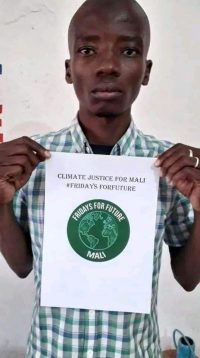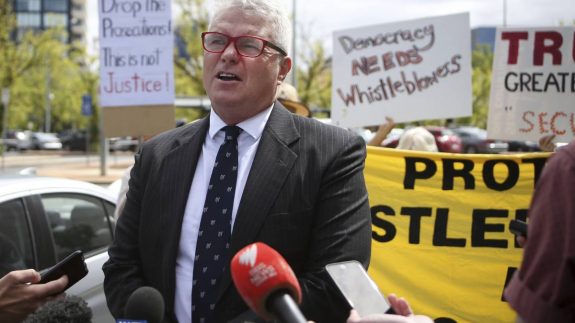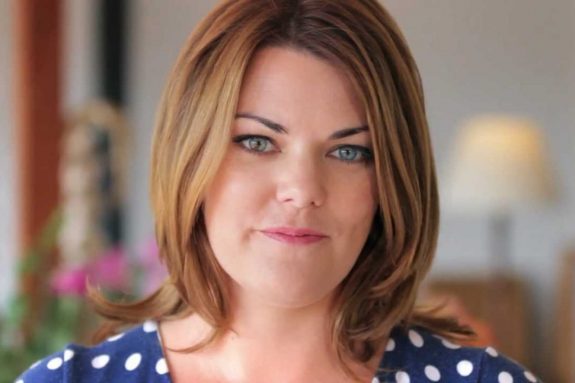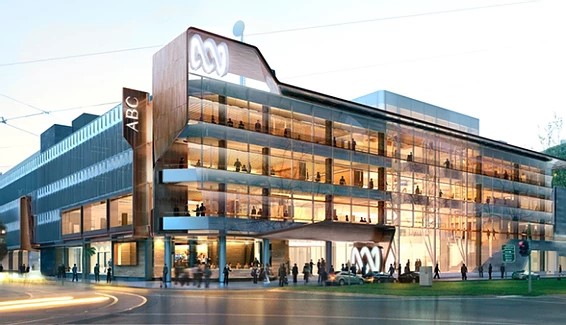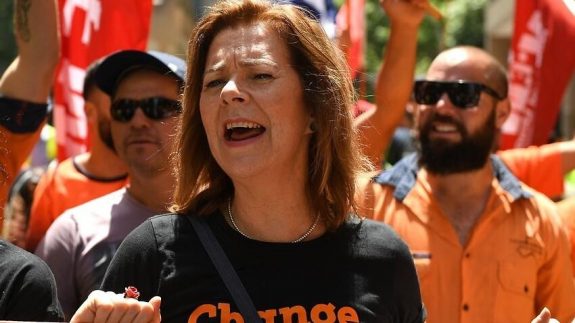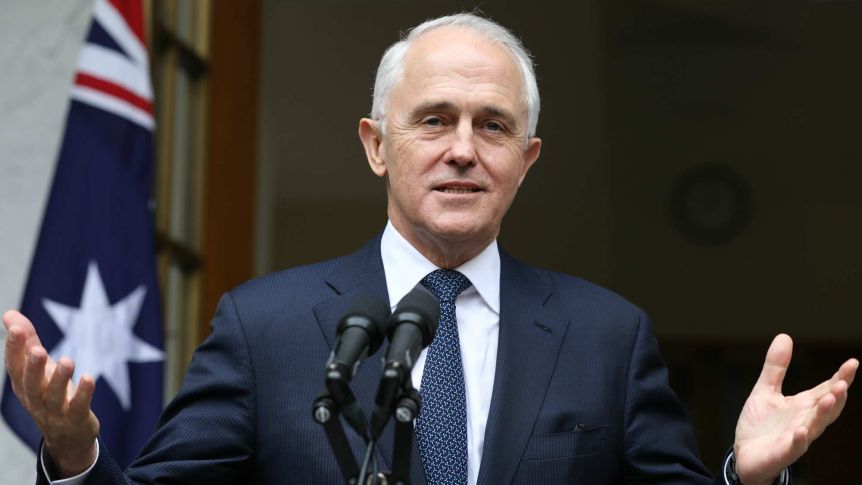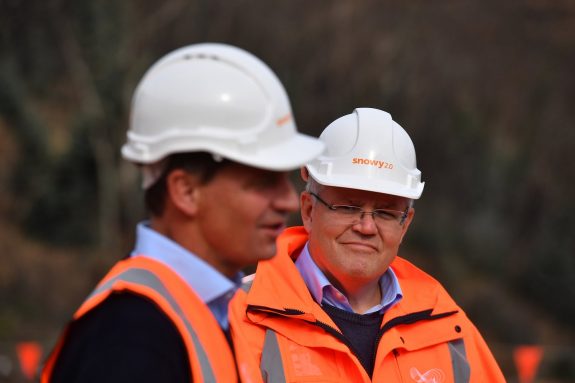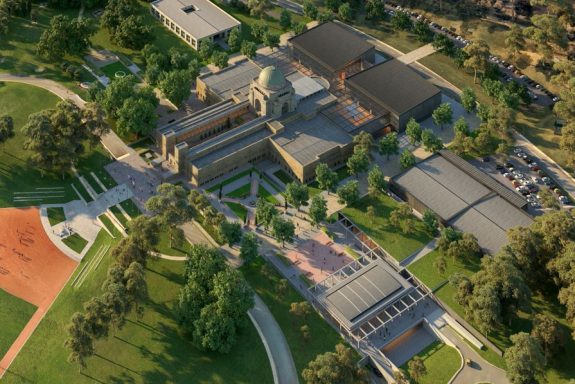In any other universe, recovering from one public health crisis by worsening another would spark immediate backlash. An “asbestos led recovery” would be career-ending; as would a “tobacco led recovery” or a “AK-47 led recovery”. But fossil fuels have locked their harm so deeply into our lives that we have become desensitised to this incredible, radical significance of proposing to hurt humans as a pathway to helping them. What is happening here is simultaneously deadly and ludicrous. (Ketan Joshi Renew Economy).
In pristine white hard hat and air sea rescue orange Hi-Viz vest fluoro fancy dress, Scott Morrison is like some surreal, grotesquely upscaled, Lego minifigure in a budget horror movie as he bobs up like a turd in the surf off Nobby’s Beach to spruik his latest role as our national saviour in Santos and Origin’s Gas Chooses itself.
After spending a week singing an aria to himself and his government which gets things done – because “that’s what we do” as he tells Coalition toady, David Speers, on ABC Insiders, by Sunday, he’s changed his tune. His threat to build a massive new 1GW gas-fired power station to replace Liddell won’t be happening.
Yep. Scotty’s “can do” government can also undo. Why? Morrison bullshits about how private enterprise has saved us from yet another crisis. As if he’s talked them into it. Why, Energy Australia has a fabulous new gas-fired generator in the wings and – look over there – corporations have batteries and stuff just waiting to go.
No mention of Mike Cannon-Brookes who throws down the gauntlet, declaring he’ll bid for Liddell’s replacement if Scott Morrison can identify the rules of engagement. Calls Scotty’s bluff. Worse.
“Giant fossil fuel companies need subsidies to extract gas and export it? No they don’t, that is bullshit. So declare the rules of the game. That’s the way to get assets built.”
Bizarre? It’s what we’ve come to expect from a government which has no energy policy. Not a clue. But what a stunt! Trust Scotty to launch his gas-led recovery show in Tomago, home to another aluminium smelter, Coalition policy is helping to kill. It’s twenty-two minutes inland from coal terminal and post-industrial rust-bucket Newcastle. Described – along with winsome Wollongong – by John Quiggan as a “vibrant and diversified” regional centre, Newcastle has a ten per cent unemployment rate; a seventeen year low.
The Tomago smelter, one of the Hunter’s last big metal producers, is 51% owned by model corporate citizen, Rio Tinto. Drawing twelve per cent of NSW’s electricity, it’s the state’s biggest user. At mates’ rates, of course.
Our smelters typically rely on heavily subsidised coal-fired electricity with gas back-up plants. If they shut their doors, as Rio keeps threatening, power companies’ would have to shut a few generators down, too.
Tomago claims rising power prices will force it to close. But experts point to a glut of aluminium world-wide. China produces 62 per cent to our 3.3. In 2017, moreover, Tomago forged an eleven year baseload power supply contract deal with Macquarie Generation. AGL is plans to build a 250MW back up gas generator at Tomago but it costs three times as much to burn gas to make electricity than to burn coal.
Smelters account for sixteen per cent of greenhouse gas emissions from the electricity sector but there has been not a hint of any Coalition roadmap towards encouraging the industry to adopt renewables. Conspicuously lacking from Morrison’s roadmap is any acknowledgment that unless Australian industry invests in green energy then it will decline along with fossil fuels.
“Australia is one of the world’s most emissions-intensive aluminium producers. Deployment of renewable electricity is a path out of this quagmire, and the rapid fall in cost of renewables makes it more viable than ever before.” Clark Butler reports for The Institute for Energy Economics and Financial Analysis (IEEFA)
Simon Holmes à Court argues, Tomago’s crippled by Coalition incompetence; politicised mismanagement.
Australia’s four aluminium smelters are salvageable. They also offer stability to our national grid. Above all, they provide employment and support whole communities. They will be scrapped because Morrison’s government won’t admit that renewable energy is the key to their future. Will it clean up its act? Phase out fossil fuels as soon as possible? Pigs might fly. Instead the PM has a surreal cop-out, “Gas Chooses Itself”.
Sure it does. Despite being flogged as a transition fuel, gas is not good for the environment. Morrison’s messaging on gas originates in US industry bodies and think tanks. The fantasy that gas is a “transition fuel” or a “bridge” to renewables stems from the 1990s. The spin was fabricated by the American Gas Association as more evidence emerged on global warming.
Crikey’s David Hardaker refers to Marian Wilkinson’s The Carbon Club which traces the influence of US fossil fuel lobbyists to 1997 when the Frontiers of Freedom Foundation fossil lobbyists arrived in Canberra to work us over before we sent our representatives to cheat at Kyoto – “It’s not global and it won’t work.”
Wilkinson’s book begins by noting that when Tony Abbott became PM, a raft of legislation was introduced to shut down everything from the emissions trading scheme, the CEFC and the Climate Change Authority. Tim Flannery recalls being sacked from the Climate Commission. It was the first act of the Abbott government and Flannery doubts that cabinet had even met. Morrison’s leadership is still appeasing the same push.
As for (mainly methane) natural gas being any type of bridge to renewables, the notion is risible. If fully unleashed, Australia’s gas resources could be responsible for up to three times the annual carbon emissions of the entire world, reports The Australia Institute in a landmark new report, Weapons of Gas Destruction.
“Gas is a high-pollution industry that won’t create jobs while unleashing triple the world’s annual emissions into the atmosphere. To say it is ‘lose-lose’ is an understatement,” concludes Climate and Energy Program director, Richie Merzian.
Of course Gas Chooses Itself is a winner for the gas industry which is a huge user of gas, burning twice as much gas as Australian households and nearly as much as our manufacturing sector. But ScoMo’s no fool.
The plot reworks an old routine. Santos and Origin make a mozza from rigging the already extortionate price of gas. Laugh all the way to the bank. Demand booms, thanks to the Coalition’s, Gas-led Recovery Plan. Santos and Origin also rake in millions in subsidies for their Pythonesque carbon capture and storage (CCS) scam.
CCS is ludicrous. Capture, transport and bury millions of tonnes of carbon dioxide from coal power plants? How good is Peabody Coal’s propaganda unit? US Coal baron Robert Murray freely admits that CCS is baloney. A fantasy. Murray says CCS is a con. It ‘does not work’ and ‘is just cover for the politicians.’
Trust Scotty to promise a con that the UN Development program says would “arrive on the battlefield far too late to help the world avoid dangerous climate change”. Bush fire victims know all about his late arrivals.
CCS is expensive and impracticable. Not only is energy wasted burying carbon, retrofitting a 2100-megawatt brown coal-fired power station in Victoria would “conservatively” cost a whopping $2.45 billion per boiler.
Governments showered $1.3 billion on CCS from 2007-13 with not one commercial working model to show for the money, but “simp” Scotty from marketing believes in it; he’ll surely find a bit extra in the kitty for his mining pals. Cut back on social services, hospitals and widows’ pensions. Incentivise self-reliance.
Scotty’s chosen the right setting to announce his gas-fired delusion. Newcastle is spiritual godfather to our state of the art asylum-seeker gulags and our perverse delight in punishing the elderly, infirm and those out of work. Debit where debit is due, our PM himself, was quick to back our Robodebt extortion scam which led some pensioners to take their own lives. Over 2000 people died after receiving Centrelink debt notices.
Yet their debts outlived them. Anastasia McCardel received a call from a Centrelink in May. Told her son Bruce owed $6,744.52. When would she repay his debt? Bruce had died six months earlier, in November 2018, aged 49. He was born with Noonan syndrome, a genetic condition that affects the heart and other vital organs.
You can’t just blame Scott Morrison. Success has many fathers. Failure is an orphan. As treasurer in 2016, former social services supremo, Morrison was supported by Christian Porter, Alan Tudge and Stuart Robert, who were high-fiving and jiving at the promise of automated welfare debt recovery. But not this week.
The Federal Court learns at a pre-trial hearing on Monday that Gordon Legal plans to argue that Big Al Tudge, who was Human Services minister in 2016-17, either knew or was “recklessly indifferent” to the fact the botched program was unlawful. Luckily Tudge, is tied up at the moment explaining how he had nothing at all to do with the taxpayer paying $30 million for a $3 million parcel land for a Sydney airport.
The Australian National Audit Office finds that the federal government bought land from dairy farmer and Liberal Party donor, Leppington Pastoral Company, at 10 times its market value while developing Western Sydney Airport. Urban Infrastructure Minister, Tudge has a stunning reverse Nuremberg alibi.
There “is no question of ministerial involvement”, he swears. The matter “goes to the administrative actions of the department, more than two years ago”. Doubtless Big Al will quickly get Robodebt to retrieve the overpayment from Leppington Pastoral. The letter threatening debt collection’s already in the mail.
Beyond the joy it gives our MPs to further impoverish men and women struggling to exist on forty dollars a day by imposing debt repayments, while fat cats in our gas industry cartel get massive handouts, double punishment is a tradition: like double standards, it is rooted deeply in our convict colony origins.
Newcastle, like Norfolk Island, was a penal settlement inside a penal colony – or a place of secondary punishment for convict re-offenders until 1813. For nearly 20 years, wayward convicts were flogged amidst idyllic natural beauty, a place where summers are warm and humid and winters are short and cool. Plants flourished in fertile, soft, absorbent carbon rich soils until cloven-hoofed sheep and cattle ruined them.
Punishment, however, is perennially problematic. Although it was easy to dispense, flogging was not foolproof. It often killed the convict or reduced his capacity to work. Furthermore, when convicts were unable to work because they had been flogged, they needed to be flogged again for not working.
Similarly, job-seekers cut off from all extra support on New Year’s Day 2021 will need to present themselves at job interviews they can’t afford to attend – having frittered away their recklessly generous work incentive-sapping allowances on op-shop clothing, fares, haircuts and the chore of having to feed themselves.
Or pay the gas bill.
Unemployed or underemployed workers are already punished by the humiliation of having to apply for jobs under the Job Active scam, a privatised “job-provider” service they may not be able to get to and double punished should they not attend. Their meagre payments can be suspended. Meanwhile, Rick Morton estimates that job-providers have banked $500 million of taxpayers money during the pandemic.
But Morrison’s got that covered. As he explains, gas will bring back jobs. At least for a few mates. Scotty’s role has a touch of the post-apocalyptic zombie as he helps the Liberal Party’s craven mining oligarchy mates prop up dying coal and gas industries as they collude to cook the planet and snuff out life as we know it.
Left-leaning, (as our national media love to dub any outfit not funded by our barons of industry) Grattan Institute calculates that ScoMo’s gas led recovery” would benefit fewer than 1% of Australian manufacturing jobs currently in gas-intensive industries. The report is leaked to the left-leaning The Guardian Australia.
15 facilities that together employ just 10,000 people consume two-thirds of gas used in manufacturing.
“There are almost no jobs in [gas] … If we were going to see a massive boom in gas-based manufacturing, we should be seeing it right now. And we’re not seeing it,” says The Grattan Institute’s Tony Wood.
Gas Chooses Itself features our elected representatives tipping buckets of public money into a failing private cartel. Origin and Santos. Scotty promises subsidies of $52.9m, support to “open up” five new gas basins and a beaut new National Gas infrastructure plan.
His announcement sounds eerily similar to a leaked paper from a working party of his gas-industry dominated cabal, the National Covid Coordination Commission (NCCC) which meets in secret under the stewardship of nifty Nev Power to further its own interests under the guise and confidentiality of a cabinet committee.
But there’s more. Santos and Origin will be subsidised under the carbon capture and storage boondoggle. The Australian Renewable Energy Agency will be tweaked so it can fund CCS, a scam which has already cost us a fortune. He’ll also kill off innovation, undermine renewable energy and prop up costly failing fossil fuels, warns Christine Milne, global Greens ambassador and former leader of the Australian Greens.
The world’s largest coal port, Newcastle’s is also NSW’s post-industrial rust belt: 4000 manufacturing jobs vanished since 2015. Green steel made with hydrogen is the answer says The Grattan Institute. Not coal. Nor gas. Hydrogen is also proposed for aluminium smelting. But you can’t tell the PM anything. He’s out overacting again; hamming it up in his blokey construction costume; lying about gas and coal.
Talk about miracle Morrison. Gas will bring back Australian manufacturing (like Lazarus from the dead).
He’ll say anything. On ABC Insiders, he tells David Speers that “Gas has chosen itself” just in case you think his decision has anything to with his secret cabal of gas industry barons cunningly dubbed his Covid Commission. Coal is the key way to keep electricity prices cheap he bullshits.
“In Australia, you cannot talk about electricity generation and ignore coal,” he rants in his pants on fire plan.
Coal, Morrison says, will not only “continue to play an important role in our economy for decades to come”, but “with new technologies such as carbon capture and storage continuing to improve, it will have an even longer life”. New? Continue to improve? CCS has never worked. KFC employs more of us than thermal coal.
The proportion of the total workforce employed in thermal coal is one quarter of one per cent of our total workforce of twelve million – or around 20-25,000. The ABS calculates, on the other hand, that 20,000 of us work in renewable energy activities.
Oddly Scotty doesn’t mention steel. While one in five local youngsters are seeking work, the steel town is in the Hunter whose iconic thermal-coal-mines employ at best five per cent of NSW’s workforce, whatever its MP, Shadow Minister for Agriculture and Resources, Joel Fitzgibbon wants us to believe. Or Morrison or Matthew Canavan whose brother is big in coal mining for that matter. And thermal coal is plunging to an average price of $60-70 a metric tonne from $100 in January.
Peabody plans to sack half its workforce at Wambo, blaming Coronavirus but demand for coal is dropping in Europe and the US while China is using more domestic coal and less of the more expensive imported black rock, especially from Australia. Aping Trump’s poke a panda policy is costing us dearly.
Even so, why does, our Trumpista PM head to coal central to promise his preposterous gas-led recovery?
Could it be just bastardry? Fitzgibbon is Labor’s shadow minister for resources. So entrenched is Labor bashing that already 9 News is crowing about a Labor split over gas. This is part of Morrison’s crafty plan.
So, too is the nobbling of any emissions target. The government’s position is not to have a position.
“The renewable energy target is going to wind down from 2020, it reaches its peak in 2020, and we won’t be replacing that with anything,” climate denialist Energy Minister Angus Taylor boasts.
But what’s this? Not even Simon Benson is in attendance, Tuesday – Scotty from marketing heroically risks anti-climax or exposing his signature, saponaceous, insincerity. Of course, his list of talking point slogans, boasts and empty promises is dropped to every media outlet in the land – and beyond – his government is gunner,
“… reset the east coast gas market … create a more competitive and transparent Australian Gas Hub by unlocking gas supply, deliver an efficient pipeline and transportation market, and empower gas customers.”
Perhaps it’s prudent that, he holds no “How good is gas?” presser afterwards. Embracing Big Gas as our saviour, creating jobs and driving down prices, may trigger a repeat of his Cobargo bushfire reception where he was run out of town.
Of course, crocodile teary Scotty could still be smarting from his rebuke over bullying Annastacia Palaszczuk to secure a quarantine exemption for Sarah Caisip to attend her stepfather’s funeral in Queensland. Palaszczuk’s office reports Morrison shouting down the phone, “You will do this.” Then there’s his politicising private grief.
In an open letter to the PM, Caisip’s stepsister Alexandra Prendergast excoriates Morrison for using her grieving family “to try and advance your political agenda”. But Morrison will stop at nothing.
As Christine Milne opines in The Guardian Australia, as she calls out the government’s wilful sabotage of its renewable energy agency, there is one certainty you can rely on in Australia. “Namely the Morrison government’s championing of fossil fuels, relentless attacks on renewable energy, lies about its commitment to emission reductions, openness to fossil fuel donations and sabotaging any institutional framework that works in driving investment in the technologies desperately needed to get us to a zero emissions future.”
It’s a calculated snub. If Morrison intended to do anything about emissions or energy he would not have Angus Taylor as Energy and Emissions Minister. But how good is Gus at browning off greenies?
Whether it’s poisoning endangered grasses or trashing Clover Moore’s environmentalism by falsely accusing her of jet-setting based on a web document no-one’s been able to find, go-getter Gus is always on the go. Like his PM, he’s all for “moving on – I’ve dealt with that.”
Don’t even try to bring up the $79 million, Eastern Australia Irrigation, his Cayman Island registered company made in 2017 from selling overland flow water licences, on its Clyde and Kia Ora farms after the same sort of water at two southern Queensland cotton farms, nearby, was valued at zero.
OK, Barnaby Joyce signed off on the record closed tender deal. But he was only the Water Minister at the time. And, as he tells ABC’s Pats Karvelas, any claims of any wrongdoing are “an absolute load of horse poo.” Curiously, his puerile protest is repeated in every major daily and every online regional newspaper in the land.
This week, Taylor and Morrison send the whole country back to the future with a gas-led recovery plan boondoggle: a plan to have a plan to sell us methane – always spun as “natural gas” king – along with a vision of a West-East trans Australia pipeline. But, wait, there’s more. Before, seven days’ later, it’s revoked.
A state-run, gas-fired power plant will replace Liddell in Hunter, Joel Fitzgibbon’s electorate. If need be. Only a week later, it’s not. Morrison’s “major speech” on energy policy is a tour de force of absurdist theatre. If it ain’t broke, don’t mean we won’t bullshit about fixing it. And if it’s broke, don’t mean we can’t make it worse. Gas powered electricity will only serve to push up prices and help cook an overheated globe.
“We are in the ludicrous situation of having a gas policy we don’t need, and none of the climate policy that we actually do,” warns The Saturday Paper’s Mike Seccombe.
Yet Taylor’s on thin ice. Only two years ago, Gufee Pty Ltd (as Angus James Taylor calls himself in his personal private company) was colluding over sushi, tempura washed down with a frosty XXXX Gold at Kagawa in Dickson, to install Spud Dutton and topple Kermit Turnbull, the PM his deluded opponents see as a Green-Left Galaxy mole, according to Morrison stenographer at The Australian, Simon Benson.
Liberal renegade Mal’s NEG emissions target is the last straw. Benson claims a senior cabinet minister blabs,
“I have been wrong all along. I thought he should have joined the Labor Party. Turns out he should have joined the Greens.” Yet not one Liberal opposed Turnbull’s $1.75m donation to help buy it the 2016 election.
But the coup proves a fiasco. Numbers man, Matthias Cormann can’t add up. Dutton’s cabal is stooged by another player. Spud’s weights are put up by party race fixer, soapy ScoMo, whose followers first fake a plunge on Dutton, to force a spill only to change their votes to Morrison in a second ballot.
Disraeli called soapy Sam Wilberforce, unctuous, oleaginous, saponaceous, in the 1860 Oxford evolution debate. He could have been describing our current PM. But only if he overlooked the killer instinct.
No good deed goes unpunished in Scotty’s playbook. Duttonista Gus finds his mind greatly exercised now that Scotty’s just slipped Spud a political Novichok cocktail. Dutton will find his new dog’s breakfast of Defence and Border Force just as unworkable as Turnbull’s Home Affairs of federal police, ASIO, Australian Border Force, immigration, counterterrorism and emergency management.
Samuel Johnson knew a thing or two about Taylor’s likely frame of mind, “Depend upon it, sir, when a man knows he is to be hanged in a fortnight, it concentrates his mind wonderfully.”
Morrison’s not going to push Gus under a bus tomorrow but pushing him out on stage and praising him as a deep thinker; the intellectual heavyweight of the Coalition energy team cannot bode well. The PM’s hyperbole is damning.
“He brings an enormous amount of intellect and experience to these tasks.”
“What we are speaking of today really is the extraordinary work that Angus has done in this portfolio as energy and emissions reduction.”
Some accuse Gus of being a lightweight. Or dilatory. But that would be to wilfully misread our political class. True, seven years down the track, the Coalition has no energy policy. But that’s its policy. Just as Morrison’s way of dealing with the pandemic and a collapsing economy is business as usual.
So calamity Taylor takes a gas axe to renewables this week. Bugger the planet. Gunner Morrison’s fossil fuel energy and noxious emissions minister can’t say when or how but he’s in the job to profit the Liberal Party’s mining industry mega-donors. Crony capitalism. Scott’s been promising we’re gunner have a gas-led recovery. Or snap-back as our ruling elastic band of Liberal toadies and big business and banking sycophants has it.
But Gus is not all gaseous catastrophe, however much the assonance appeals to Katharine Murphy. To Murpharoo, Scott Morrison’s power plan is nothing but a gas-fuelled calamity. A rump in the government even protests Morrison’s prioritising of gas over coal, as David Crowe reminds the rapidly declining readers of Nine newspapers Friday. Labor’s Joel Fitzgibbon is cheering them on. Yet things could turn bad in November.
Perhaps Morrison’s been tipped off that Russian interference in the US Presidential election, will confer victory upon Trump, the useful idiot who has been putty in the hands of American fossil fuel barons.
The alternative is sobering. “The Biden administration will impose carbon adjustment fees or quotas on carbon-intensive goods from countries that are failing to meet their climate and environmental obligations.”
Or as Peter Brent writes, “Australian global warming politics is broken. If we’re too hopeless to price our carbon, someone else should price it for us.”
Pulling the pin on wind and solar? News this week confirms hard-nosed investors have taken flight; fled the electricity generating field by the gigajoule, which is how you measure the energy content in natural gas if you can afford any. Utility scale generation of green energy dropped by half during 2019 thanks to “Herbicide” Taylor’s climate-denialist sabotage of our children’s futures. But you can’t blame him for our gas cartel which fixes prices to suit itself and which is not even obliged to let the government know its reserves.
If you want affordable Australian gas, best emigrate to Japan. Customers in Japan buy Australian gas more cheaply than we can, reports Michael West. Some of this gas is drilled in the Bass Strait, piped to Queensland, turned into liquid and shipped 6,700 kilometres to Japan … but the Japanese still pay less than Victorians. It’s enough to drive a family back to burning dung. Two billion people worldwide swear by it.
But you’d be hard pressed to pick our venture capitalists’ mass stampede. All round business investment is plummeting. Bernard Keane reckons it’s at 2010 levels – propped up only because China is smiling on our mining exports. For the time being. Poking the Panda may look cute to our US overlords but China is poking back. Private investment in infrastructure has dipped to 2006 levels. Blind panic seizes our intrepid profiteers. After seven years of obstruction, obfuscation and chicanery – and Abbottising of our energy policy
It’s no mean feat. Renewables are hugely profitable compared to fossil. Yet ensuring the bottom falls out of investment in safe, clean power generation in the land at the arse-end of the world, as Keating fondly called his home, is the one enduring achievement of Scotty’s kakistocracy. Gus Taylor, take a bow.
True, Snowy 2.0 is still in the frame, despite a $10bn cost blowout, experts warn, but like Fizza Turnbull’s other dud, his high speed fibre to the node NBN, now fourth slowest in the OECD and one of the most expensive in the world, Snowy 2.0 is shaping to be another gigantic white elephant.
A Dear John letter from a group of no fewer than thirty-seven eminent Australian energy, engineering, economic and environmental experts, reaches Teddy Kunkel former Rio Tinto lobbyist and other former mining industry executives and coal lobbyists who dominate Scott John Morrison’s office Friday.
“It is now even more clear that there are numerous alternatives that are lower cost, more efficient, quicker to construct, and incur less emissions and environmental impacts,” the letter warns. AEMO forecasts that “inefficient, unnecessary and damaging Snowy 2.0” will never pay for itself; nor be needed until the 2030s, when emerging technologies like battery storage and demand response will have come into their own.
Unless you are a gas or coal baron, that is. Then you can count on gorgeous Gus, the Morrison government’s high-maintenance Energy and Emissions Minister to bring home the bacon; put a bit of pork on your fork.
Luckily, pumping water uphill will still require a shitload of fossil fuel so mining companies will still do well out of the twelve billion dollar pipe dream – especially big donors Santos, Origin and Woodside who funnel money into Liberal Party coffers. So what if Snowy 2.0’s pumped hydro will hike power prices and diminish supply?
Has Gus pulled the plug? Star of byzantine epic “Watergate”, featuring fellow silvertail and veteran game of mates grifter and Nats’ sideshow carnival barker, Barnaby Joyce, “Grassgate” a Tarantino homage to herbicide as an obliging Environment Minister, played by Josh Frydenberg helps Gus farewell some of the last remnants of all-but extinguished temperate grasslands and the whodunnit “Clovergate” fake document download scandal knows how to power down. In renewables, that is.
Less than two years after his PM set him up as muppet for our mining barons, aka Energy and Emissions Minister, silvertail Gussie’s buggered new wind and solar farm start-ups from near-record highs to near-record lows. Only three new projects reached completion in the last quarter – and 90 per cent of that capacity came from a single solar farm courtesy of the Queensland Labor government.
Morrison’s theatre of the absurd energy policy show is no roadmap to lower emissions, cheaper power or more jobs. It is just another calculated insult to those who have worked to honour our Paris agreement; to those who have worked tirelessly to decarbonise our economy. The rug has been pulled out unceremoniously because that’s what Scotty does best. And he’s been watching his mentor and enfant terrible Trump.
Scotty’s right wing coal warriors such as Matt Canavan may be appeased – for five minutes – Nats with interests or mates with interests in the gas industry may tolerate the sociopath and bully in him a little better, while his embrace of gas will appease key Liberal Party donors. Above all, Morrison will shrewdly have done the bidding of his cabal of mining industry executives under the guise of a coronavirus recovery plan while setting up Angus Taylor to take the blame when the inevitable repercussions are felt.
Best of all he will wedge Labor over their policy on gas.
Where it will all go pear-shaped is when gas becomes even less affordable and fails to provide jobs, let alone fulfil his rash and glib promise of bringing back a manufacturing sector – now around ten per cent of the economy – that neoliberal ideology is helping to banish forever. Emissions will continue to climb. The need for “new technology” he preaches will be exposed as a sound-bite sham. There are no new technologies that need to be developed to be decarbonised. There are, however, sports rorts yet to be accounted for.
Worse, Morrison may be exposed as a bare-faced liar as CCS is seen to be a coal industry fiction and an expensive indulgence of powerful party mates as the economy further contracts in 2021 with his ill-advised and inhumane cutting back on pensions for those out of work and those unable to work given their disabilities. The Panda factor can only exacerbate a downturn in our trade in a Coronavirus recession world
Trade with China is suffering because of Morrison’s witless desire not only to align with Trump’s trade war with Beijing but to enlist as an active belligerent. China will do us slowly write Crikey’s Michael Sainsbury. Unemployment and underemployment will soar in the New Year. Morrison has already alienated thousands of university teachers. His promised IR reforms threaten to make a bad system worse. As Dennis Atkins warns,
The all too apparent human toll of this insecurity is not enough to deter the Morrison Government from its determination to further deregulate the labour market.
The “energy roadmap” in all its intellectual and moral poverty is studded with disinformation. Despite what he claims, for example, renewables can’t “stand on their own two feet”. The Prime Minister’s gaslighting merely underlines his abdication of responsibility; his failure to provide real leadership when it was most needed.
Morrison may already have neutralised rivals, Dutton and Taylor but he will rapidly lose the confidence of MPs in marginal seats and despite his daggy dad routines; his carefully orchestrated relentless curry and cubby home-loving hubby PR campaign, voters are not mugs. They know when they’re being taken for a ride.
It may take a while given our Murdoch orchestrated cheer squad that is the mainstream media but truth will out. Especially when you can’t get work or the hours you need to put food on the table and pay the rapidly rising power bills the Prime Minister falsely promised his gas-led recovery would reduce.
Like what we do at The AIMN?
You’ll like it even more knowing that your donation will help us to keep up the good fight.
Chuck in a few bucks and see just how far it goes!

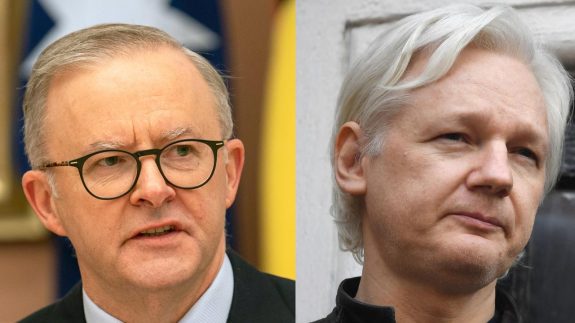










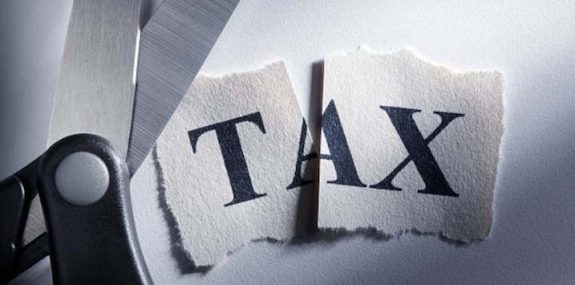
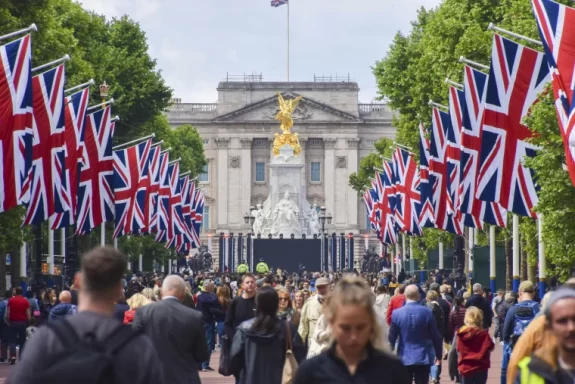
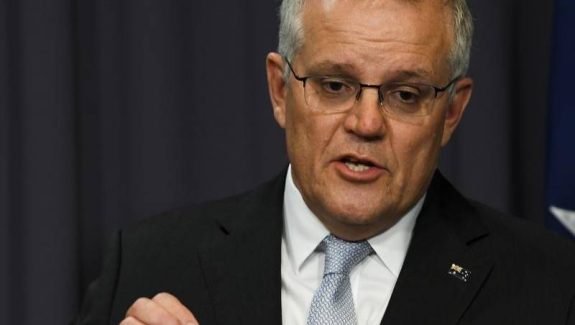
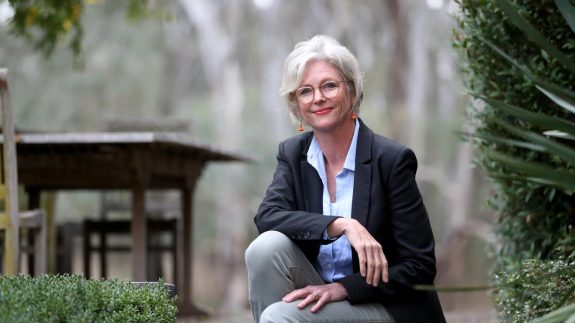

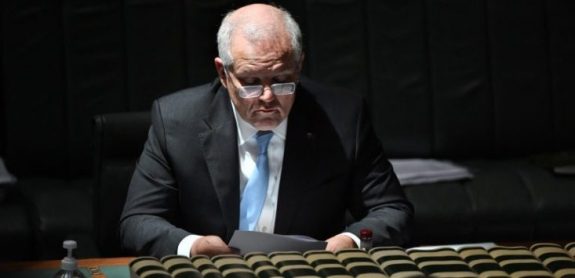
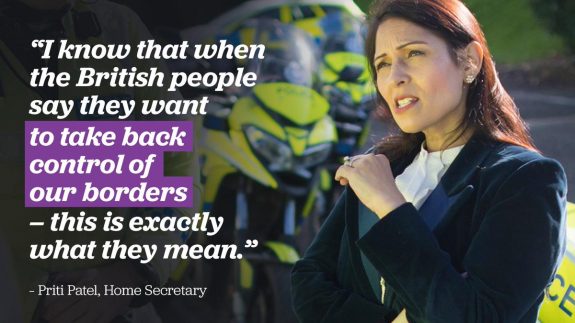

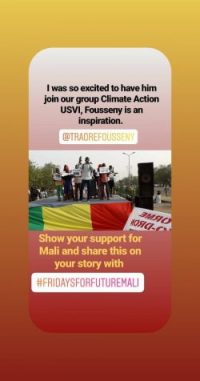 This is what I heard. Fousseny is from Bamako, Mali West Africa. In 2019 Fousseny Traoré led the
This is what I heard. Fousseny is from Bamako, Mali West Africa. In 2019 Fousseny Traoré led the 